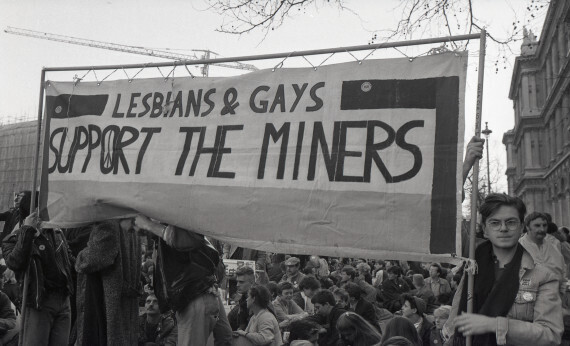Perhaps the most famous labour strike in history is the 1984-85 British miners strike. When coal pit closures led to the loss of 20,000 jobs, three quarters of Britain's 187,000 miners went on strike. Miners warned about the widespread poverty that would result from closures with their slogan: “Close a pit, kill a community.” South Wales and Scotland would lose two-thirds of their pits, making them particularly economically vulnerable in the aftermath of closures. However, the Thatcher government stockpiled coal in advance to avoid blackouts, introducing anti-strike legislation, and told police to intimidate picketers, resulting in 11 '000 arrests. As the strike continued, the National Union of Mineworkers was running out of money and needed to rely on donations.
Enter: Lesbian and Gays Support the Miners. After collecting £200 for miners at a pride event, Mark Ashton and Mike Jackson formed “a single issue solidarity group and owes no allegiance to any political party. The only requirements of members are that they are either lesbian or gay…that they support the NUM.” The group reached out to mining communities in Dulais, one of the valleys in South Wales, and while they received some initial unenthusiastic responses, they were able to meet miner David Donovan, who told them about the issues the area was facing. After their initial meeting, they invited him to a pub to give him £500 they had collected, and in turn he invited members of the group to stay with mining families in Dulais.
There were fears that due to homophobia that existed in these communities, miners would be unwilling to accept the LGSM’s help. However, when members of these communities met with LGSM, they spoke to the common experiences between miners during the strike and with LGBTQ+ and racialized communities. Sian James, a miners wife and secretary of South Wales Women’s Support Groups, stated that in the past they had “turned our back on lesbians and gays, we didn’t have anything to do with them…But suddenly WE were up for grabs. We were being attacked by the police, the media, the state.” Similarly, Donavan conceded that the risk of arrest that picketers faced was what “black people, lesbians and gays have experienced for far longer than we have.”
There was also pushback from some in the gay and lesbian community who felt that they had to focus on the AIDs crisis, and that straight miners had done nothing to support them over the years. However, Mark Ashton pushed back against this, telling a group that “the miners dig coal which is used for fuel, which makes electricity that runs these disco lights. Would you go down a mine and work? I support them because they go down there and do it. I wouldn’t!” They argued that fighting for freedom, democracy, and the rights of workers was vital for everyone, and continued to collect money outside gay and lesbian bars, clubs, and bookshops.
The LGSM’s largest event was their “Pits and Perverts Ball” at the Electric Ballroom in Camden Town, which raised £5000 for Dulais. The word was spread that any miner who attended the event would get in for free, which strengthened the ties between miners and the gay and lesbian community. When miners saw how many people had come out to support them, it challenged preconceptions, one man telling Jackson, “I’d no idea you people supported us.”
When the hard decision to return to work was eventually made, the Dulais mining community did not forget the support they had received. At a meeting in the aftermath of the return, one miner stood up and said, “Now our fight is over, it’s time to turn round and support those who have supported us for their struggle continues, and none less than the lesbians and gays who have stood by us solidly.” Miners came to Pride parades, displayed the LGSM badge, and collected donations for AIDs patients, maintaining their loyalty to the LGBTQ+ community.
The solidarity shown by LGSM displays the power of regular people to affect change in times that feel hopeless. The common ground that could be found between the working class struggle and the gay liberation movement exemplifies why it is so important to fight for each other. Ultimately, members of Lesbians and Gays Support the Miners did so, without any guarantee of reciprocity, because it was the right thing to do.
Citations
Jackson, Mike. “Lesbians and Gays Support the Miners.” LGSM. http://lgsm.org/our-history/228-lesbians-and-gays-support-the-miners
Kellaway, Kate. “When miners and gay activists united: the real story of the film Pride.” The Guardian. August 31, 2014. https://www.theguardian.com/film/2014/aug/31/pride-film-gay-activists-miners-strike-interview
Morris, Georgia. “Miners' strike 1984: Why UK miners walked out and how it ended.” BBC. March 2, 2024. https://www.bbc.com/news/uk-england-68244762
Photo taken from
https://www.bishopsgate.org.uk/collections/lesbians-gays-support-miners
